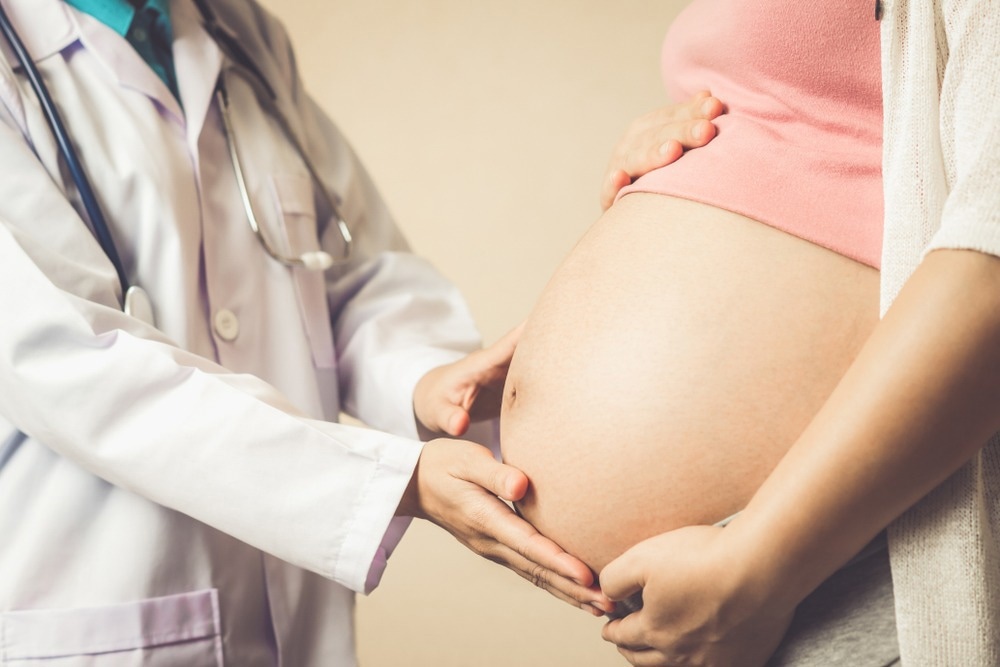Estimates indicate that the coronavirus disease 2019 (COVID-19), which is caused by infection with the severe acute respiratory syndrome coronavirus 2 (SARS-CoV-2), has been diagnosed in over 170,000 pregnant people in the United States between January 2020 and February 2022. During this same time period, over 29,000 pregnant people were hospitalized due to this disease.
Pregnancy is associated with increased susceptibility to hypoxemia, altered immune function, and a hypercoagulable state, all of which could worsen COVID-19 maternal outcomes. However, previous findings from studies conducted during the early stages of the pandemic were not definitive due to limited sample sizes.

Study: Comparison of Severe Maternal Morbidities Associated With Delivery During Periods of Circulation of Specific SARS-CoV-2 Variants. Image Credit: Blue Planet Studio / Shutterstock.com
Background
The evolution of the pandemic, along with the emergence of new SARS-CoV-2 variants, allows for more studies to be conducted on the impact of SARS-CoV-2 infection on poor maternal outcomes. Some of these outcomes include preeclampsia, eclampsia, hemolysis, elevated liver enzymes, and low platelets (HELLP) syndrome, low birth weight, preterm birth, intensive care unit (ICU) admission, sepsis, infections with other pathogens, and maternal death.
The SARS-CoV-2 Delta (B.1.617.2) variant was the dominant circulating strain in the U.S. in July 2021. Studies during that period reported higher severity of infections and adverse outcomes among pregnant women as compared to previous waves.
By December 2021, the SARS-CoV-2 Omicron (B.1.1.529) variant became the dominant circulating strain in the U.S.; however, this variant was associated with reduced disease severity as compared to the Delta variant. Maternal outcomes for pregnant women infected with the Omicron variant have not been characterized.
A new JAMA Network Open study evaluates the association between severe maternal morbidities (SMM) and SARS-CoV-2 infection.
The U.S. Centers for Disease Control and Prevention (CDC) defines SMM as unexpected outcomes during delivery and labor. Taken together, SMM consists of 21 health indicators that describe any short- or long-term consequences to the health of an individual.
About the study
The current study involved pregnant patients who delivered in 32 hospitals located across eight U.S. states, including Tennessee, Michigan, Florida, Alabama, Indiana, Texas, New York, and Maryland. The study was conducted between March 2020 to January 2022, which was further divided into four time periods based on the dominant circulating SARS-CoV-2 strain at the time.
The wild-type strain dominated from March 2020 to December 2020, whereas the Alpha variant was the dominant circulating strain between January 2021 to June 2021. Between July 2021 to November 2021, the Delta strain was the dominant circulating strain, whereas the Omicron variant dominated from December 2021 to January 2022.
Polymerase chain reaction (PCR) nucleic acid amplification testing was used to confirm SARS-CoV-2 infection. Data on SMM outcomes, race, ethnicity, SARS-CoV-2 infection status, and other patient-related information were collected.
The primary outcome was defined as the occurrence of an SMM event during hospitalization for delivery. Secondary outcomes included the total number of SMM events, as well as any non-respiratory, respiratory, and non-transfusion SMM events.
Study findings
A total of 3,129 patients with SARS-CoV-2 infection matched with 12,504 control patients with no evidence of infection. A total of 978 cases and 3,906 controls were reported during the wild-type period, 744 cases and 2,974 controls during the Alpha period, 681 cases and 2,724 controls during the Delta period, and 726 cases and 2,900 controls during the Omicron period.
Among infected patients, 21.1% were Black, 65.3% White, and 24.2% Latino or Hispanic, whereas 75.8% were neither Hispanic nor Latino. Among those who were uninfected, 20.3% were Black, 66.4% White, 24.8% Latino or Hispanic, and 75.2% were neither Hispanic nor Latino.
Patients diagnosed with SARS-CoV-2 infection more frequently had preterm deliveries as compared to those without infection. Furthermore, higher rates of any SMM event were observed for patients with SARS-CoV-2 infection as compared to those without infection, except for the Omicron variant.
The risk for any SMM was highest for the Delta period as compared to other periods. Additionally, patients with COVID-19 reported higher rates of respiratory and non-respiratory SMM for all variants except Omicron. The risk of adverse events was also higher for patients with SARS-CoV-2 infection.
Although lower, the risk was still significant for the Omicron variant. Moreover, the sensitivity analysis indicated that the characteristics of the propensity-matched population were similar to the primary analysis. The association of SARS-CoV-2 infection with the primary and secondary outcomes was also similar.
Conclusions
The current study determined that SARS-CoV-2 infection during delivery was associated with higher SMM rates, which were highest for the Delta variant.
This observation emphasizes the importance of preventing SARS-CoV-2 infection, particularly among pregnant women. It also indicates that COVID-19 is a high-risk factor during the peripartum period.
Limitations
The current study did not include reports on maternal vaccination status. An additional limitation was that every patient during the wild-type period was not tested for SARS-CoV-2, and universal testing could not distinguish symptomatic COVID-19 from incidentally discovered infection.
Patients who were infected during their pregnancy and recovered by the time testing was performed were not recognized; therefore, the effects of previous SARS-CoV-2 infection on these maternal outcomes could not be concluded.
Furthermore, genetic sequencing was not carried out to confirm the SARS-CoV-2 strains. A final limitation was that since the current study was limited to hospitals, the results might not be generalizable to a broader population.
Journal reference:
- Mupanomunda, M., Fakih, M. G., Miller, C., et al. (2022). Comparison of Severe Maternal Morbidities Associated With Delivery During Periods of Circulation of Specific SARS-CoV-2 Variants. JAMA Network Open. doi:10.1001/jamanetworkopen.2022.26436.